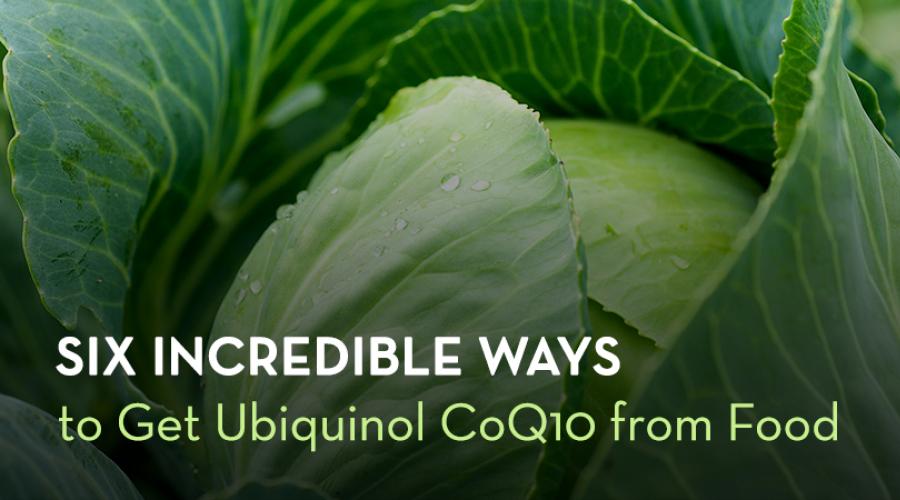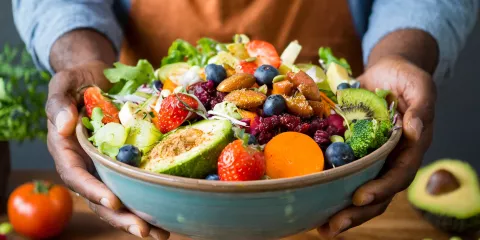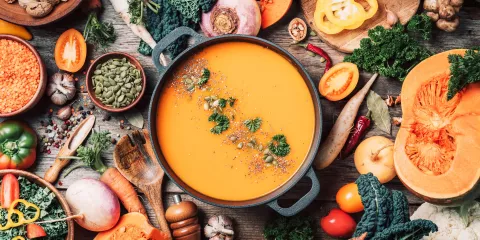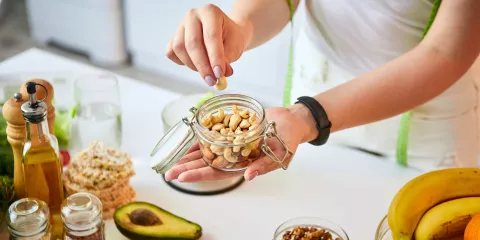
The Ubiquinol form of CoQ10 is an important nutrient that plays a crucial role in supporting heart health and more. However, as we age, the process of converting conventional CoQ10 into Ubiquinol becomes less efficient.
Our daily diet is a key part of our health, and many nutrients are found in everyday foods that can potentially replace the need for a supplement. When it comes to Ubiquinol, though, the best way to ensure you’re receiving a sufficient amount is through a softgel capsule. However, let's take a closer look at some everyday foods you may be surprised to learn have trace amounts of Ubiquinol CoQ10.
Related: What is Ubiquinol and Why Does it Matter?
Foods with Ubiquinol
Adding foods that contain the Ubiquinol form of CoQ10 into your daily diet is a great step towards living a heart-healthy lifestyle, but taking a daily supplement of Ubiquinol is the most efficient way to get an adequate intake. While these foods offer trace amounts of Ubiquinol, it’s important to note that you’d need to eat an immense amount of them to get enough Ubiquinol to match what’s in a typical Ubiquinol softgel capsule! For example, you’d need to consume 187 average-sized avocados to get the same amount of Ubiquinol in a typical supplement (that is, 100 mg per softgel).
Want to learn more about the benefits of Ubiquinol CoQ10 for heart health, cellular energy production, and antioxidant protection? Our Free Buyer’s Guide can answer many of your questions and help you add this heart-healthy nutrient to your daily routine.
Ubiquinol In Your Daily Diet
Many people take Ubiquinol supplements as an addition to their daily diet. Ubiquinol has been shown to promote heart health, support healthy aging and replenish CoQ10 levels depleted by cholesterol-lowering statin drugs. A typical serving of Ubiquinol is 100 milligrams taken once per day, the amount generally recommended on supplement labels.
Technically speaking, it’s possible to get this daily serving amount without a dietary supplement – but we don’t recommend trying to do so, even if you’re adventurous and unusually hungry. Here’s a list of foods that contain Ubiquinol which you can easily add to your healthy, balanced diet. Just don’t count on any foods to replace a Ubiquinol supplement.
Fatty Fish
One of the most well-known Ubiquinol food sources is fatty fish. Salmon, tuna, and sardines are all excellent choices, as they're not only delicious but also contain Ubiquinol. Plus, they're a great source of omega-3 fatty acids, which have been shown to support heart health, brain function, and more.
Beef, Pork, and Chicken
If you're a meat-eater, you'll be happy to know that beef, pork, and chicken also contain Ubiquinol. When choosing your meat, try to opt for grass-fed beef and free-range chicken.
Ubiquinol Food Profile: Beef Liver
Beef liver may not be popular on the American dinner table but the organ meat is loaded with nutrients. It’s a vitamin B12 jackpot and also contains the Ubiquinol form of CoQ10.
But, you’d need to eat more than five pounds of beef liver to get 100 milligrams of Ubiquinol CoQ10. Consuming that much liver in a day is not recommended and would certainly overload your body --- probably to the point of toxicity.
Nuts and Seeds
Snacking on nuts and seeds is another great way to get some Ubiquinol from food. Almonds, peanuts, and sesame seeds are all great choices, as they not only contain Ubiquinol but are a good source of protein, fiber, and healthy fats.
Vegetables
Believe it or not, many vegetables include trace amounts of Ubiquinol. Broccoli, cauliflower, and spinach have varying levels of Ubiquinol and are packed with other essential vitamins and minerals. Other great options include sweet potatoes, carrots, bell peppers, and cabbage. But, before you stock up on vegetables instead of taking your Ubiquinol supplement, let’s dig in.
Ubiquinol Food Profile: Cabbage
People have cultivated cabbage for nearly 2,000 years not only because it’s delicious, but also because it’s thought to have certain healing properties. You probably know cabbage more for its smell than for it being a natural source of Ubiquinol.
However, obtaining 100 milligrams of Ubiquinol from cabbage would require you to eat an incredible 133 cups of the leafy vegetable in a single day.
Fruits
Some fruits also supply Ubiquinol. Avocado, strawberries, and oranges are all excellent choices, not only for Ubiquinol but because they are packed with other nutrients that are great for your overall health.
ICYMI: 12 Months of Healthy Eating: Colors of the Rainbow
Ubiquinol Food Profile: Oranges
If you’re like most people, you enjoy the taste of oranges and know they’re packed with essential nutrients such as vitamin C.
It’s hard to argue oranges are anything but nutritionally sensible. That is, unless you’re counting on them to give you a 100 milligram daily serving of Ubiquinol.
You’d need to eat a staggering 868 oranges to get enough Ubiquinol to match what’s in a typical Ubiquinol softgel capsule.
Whole Grains
Last but not least, whole grains like brown rice, quinoa, and oats also contain Ubiquinol. They're a good source of fiber, which can help keep your digestion on track, and also contain other important nutrients like B vitamins and magnesium.
Getting Ubiquinol CoQ10 from Food: The Bottom Line
Yes, you can find small amounts of the Ubiquinol form of CoQ10 in many everyday foods, but the reality is that you can’t get the amount of Ubiquinol that’s easily delivered in supplement form.
If you're concerned about your Ubiquinol levels or have other health concerns, talk with your healthcare provider. They can help you determine whether a Ubiquinol supplement is right for you, and guide you on the best course of action for your health.












